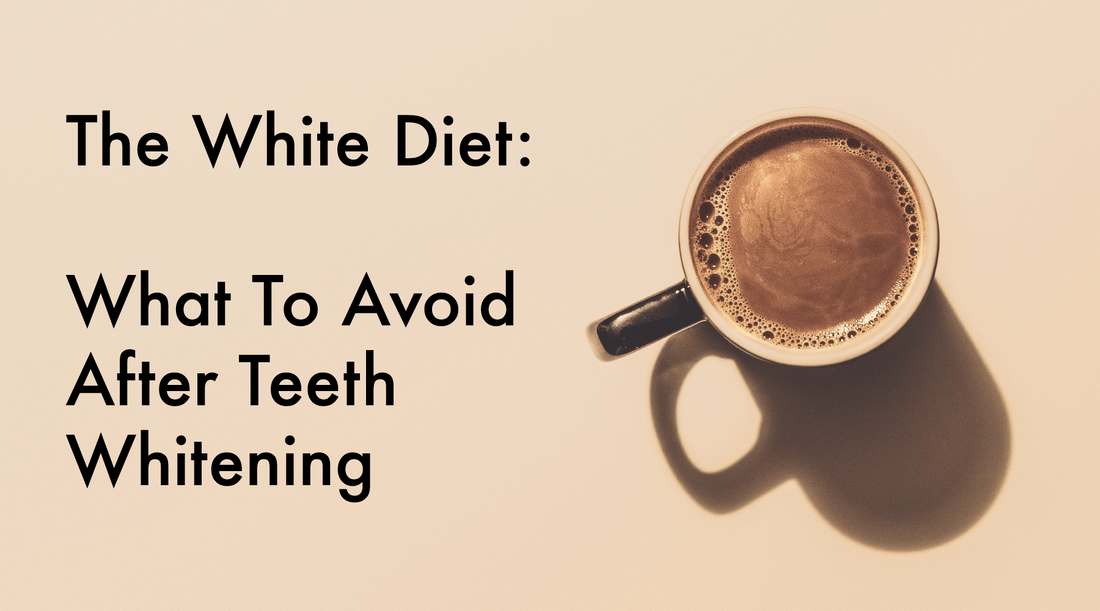
The White Diet: What To Avoid After Teeth Whitening
Share
Teeth whitening is one of the most popular cosmetic dental treatments because it can quickly transform your smile. Whether you’ve whitened your teeth in-office or used a professional at-home whitening kit, the steps you take immediately afterward play a huge role in how long your results last.
This is where the White Diet comes in. Following this short-term eating plan after teeth whitening helps protect your enamel from stains and keeps your smile bright. Let’s break down what foods, drinks, and habits to avoid so you can extend your whitening results.
Why the White Diet Matters After Teeth Whitening
When teeth are freshly whitened, the enamel is more porous and vulnerable to staining. Consuming the wrong foods or drinks during the first 24–48 hours can quickly undo your whitening results. The White Diet focuses on keeping pigments and dark compounds away from your enamel until it recovers, so your smile stays radiant.
Foods to Avoid After Teeth Whitening
Dark-Colored Foods That Stain Teeth
Some foods are notorious for leaving behind pigments that cling to enamel. Right after whitening, these stains can set in even faster.
Avoid these foods for at least 48 hours:
- Chocolate
- Blueberries, blackberries, raspberries
- Tomato-based sauces
- Soy sauce
- Balsamic vinegar
- Curry and turmeric-based dishes
If you do eat these foods too soon, the pigments can dull your results and make your smile appear uneven.
Drinks to Avoid After Teeth Whitening
Beverages That Cause Stains and Erosion
Drinks often play a bigger role in tooth discoloration than food. Coffee, tea, and wine are among the most common culprits.
Limit or avoid these beverages for 48 hours:
- Coffee
- Black tea
- Red wine
- Cola and dark sodas
- Colored sports and energy drinks
- Slushies or icee-style drinks
These beverages contain chromogens and acids that both stain and weaken enamel. If you can’t resist, drink them through a straw to reduce contact with your teeth and rinse with water afterward.
Smoking and Teeth Whitening Results
Nicotine and tar are major enemies of a white smile. Smoking doesn’t just stain teeth — it causes yellowing, bad breath, gum problems, and long-term oral health risks.
For the best whitening results, avoid smoking for at least 48 hours. Ideally, quitting altogether will not only protect your new smile but also improve your overall health. According to the American Dental Association, smoking contributes to gum disease, delayed healing, oral cancer, and significant tooth staining.
How to Maintain Your White Smile
Whitening is just the first step. To make your results last:
- Brush and floss daily with an enamel-safe toothpaste
- Stay hydrated and rinse after meals
- Stick to the White Diet during the first 48 hours
- Schedule regular dental cleanings and checkups
By combining good habits with professional whitening treatments, your smile can stay bright for years.
Frequently Asked Questions
How long should I follow the White Diet after whitening?
Most dentists recommend following the White Diet for 24–48 hours. This is when your teeth are most vulnerable to staining. Some people extend it up to 72 hours for extra protection.
Can I drink coffee after teeth whitening?
It’s best to avoid coffee for at least 48 hours. If you must, use a straw to minimize contact with your teeth and rinse your mouth with water immediately afterward.
What foods are safe to eat after whitening?
Stick to light-colored or neutral foods. Examples include chicken, turkey, white fish, rice, potatoes, cauliflower, bananas, and dairy products like yogurt or cottage cheese.
Does smoking ruin whitening results?
Yes. Even one cigarette can cause new stains on freshly whitened teeth. Quitting smoking not only protects your smile but also reduces your risk of gum disease and oral cancer.
How do I keep my teeth white long-term?
Along with good oral hygiene, maintaining your whitening results is easier with occasional touch-ups using professional at-home whitening products. Following the White Diet immediately after each treatment gives you the best starting point.
